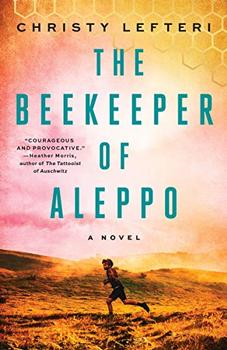Summary | Excerpt | Reading Guide | Discuss | Reviews | Beyond the Book | Readalikes | Genres & Themes | Author Bio

A Novel
by Christy Lefteri1
I am scared of my wife's eyes. She can't see out and no one can see in. Look, they are like stones, gray stones, sea stones. Look at her. Look how she is sitting on the edge of the bed, her nightgown on the floor, rolling Mohammed's marble around in her fingers and waiting for me to dress her. I am taking my time putting on my shirt and trousers, because I am so tired of dressing her. Look at the folds of her stomach, the color of desert honey, darker in the creases, and the fine, fine silver lines on the skin of her breasts, and the tips of her fingers with the tiny cuts, where the ridges and valley patterns once were stained with blue or yellow or red paint. Her laughter was gold once, you would have seen as well as heard it. Look at her, because I think she is disappearing.
"I had a night of scattered dreams," she says. "They filled the room." Her eyes are fixed a little to the left of me. I feel sick.
"What does that mean?"
"They were broken. My dreams were everywhere. And I didn't know if I was awake or asleep. There were so many dreams, like bees in a room, like the room was full of bees. And I couldn't breathe. And I woke up and thought, please don't let me be hungry."
I look at her face, confused. There is still no expression. I don't tell her that I dream only of murder now, always the same dream; it's only me and the man, and I'm holding the bat and my hand is bleeding; the others aren't there in the dream, and he is on the ground with the trees above him and he says something to me that I can't hear.
"And I have pain," she says.
"Where?"
"Behind my eyes. Really sharp pain."
I kneel down in front of her and look into her eyes. The blank emptiness in them terrifies me. I take my phone out of my pocket, shine the light of the flashlight into them. Her pupils dilate.
"Do you see anything at all?" I say.
"No."
"Not even a shadow, a change of tone or color?"
"Just black."
I put the phone in my pocket and step away from her. She's been worse since we got here. It's like her soul is evaporating.
"Can you take me to the doctor?" she says. "Because the pain is unbearable."
"Of course," I say. "Soon."
"When?"
"As soon as we get the papers."
I'm glad Afra can't see this place. She would like the seagulls though, the crazy way they fly. In Aleppo we were far from the sea. I'm sure she would like to see these birds and maybe even the coast, because she was raised by the sea. I am from eastern Aleppo, where the city meets the desert.
When we got married and she came to live with me, Afra missed the sea so much that she started to paint water, wherever she found it. Throughout the arid plateau region of Syria there are oases and streams and rivers that empty into swamps and small lakes. Before we had Sami, we would follow the water, and she would paint it in oils. There is one painting of the Queiq I wish I could see again. She made the river look like a storm-water drain running through the city park. Afra had this way of seeing truth in landscapes. The measly river in the painting reminded me of a struggle to stay alive. Thirty or so kilometers south of Aleppo, the river gives up the struggle of the harsh Syrian steppe and evaporates into the marshes.
I am scared of her eyes, but these damp walls, and the wires in the ceiling, and the billboards—I'm not sure how she would deal with all this, if she could see it. The billboard just outside says that there are too many of us, that this island will break under our weight. I'm glad she's blind. I know what that sounds like! If I could give her a key that opened a door into another world, then I would wish for her to see again. But it would have to be a world very different from this one. A place where the sun is just rising, touching the walls around the ancient city and, outside those walls, the cell-like quarters and the houses and apartments and hotels and narrow alleys and open-air market where a thousand hanging necklaces shine with that first light, and, further away, across the desert land, gold on gold and red on red.
Excerpted from The Beekeeper of Aleppo by Christy Lefteri. Copyright © 2019 by Christy Lefteri. All rights reserved. No part of this excerpt may be reproduced or reprinted without permission in writing from the publisher.
Your guide toexceptional books
BookBrowse seeks out and recommends the best in contemporary fiction and nonfiction—books that not only engage and entertain but also deepen our understanding of ourselves and the world around us.